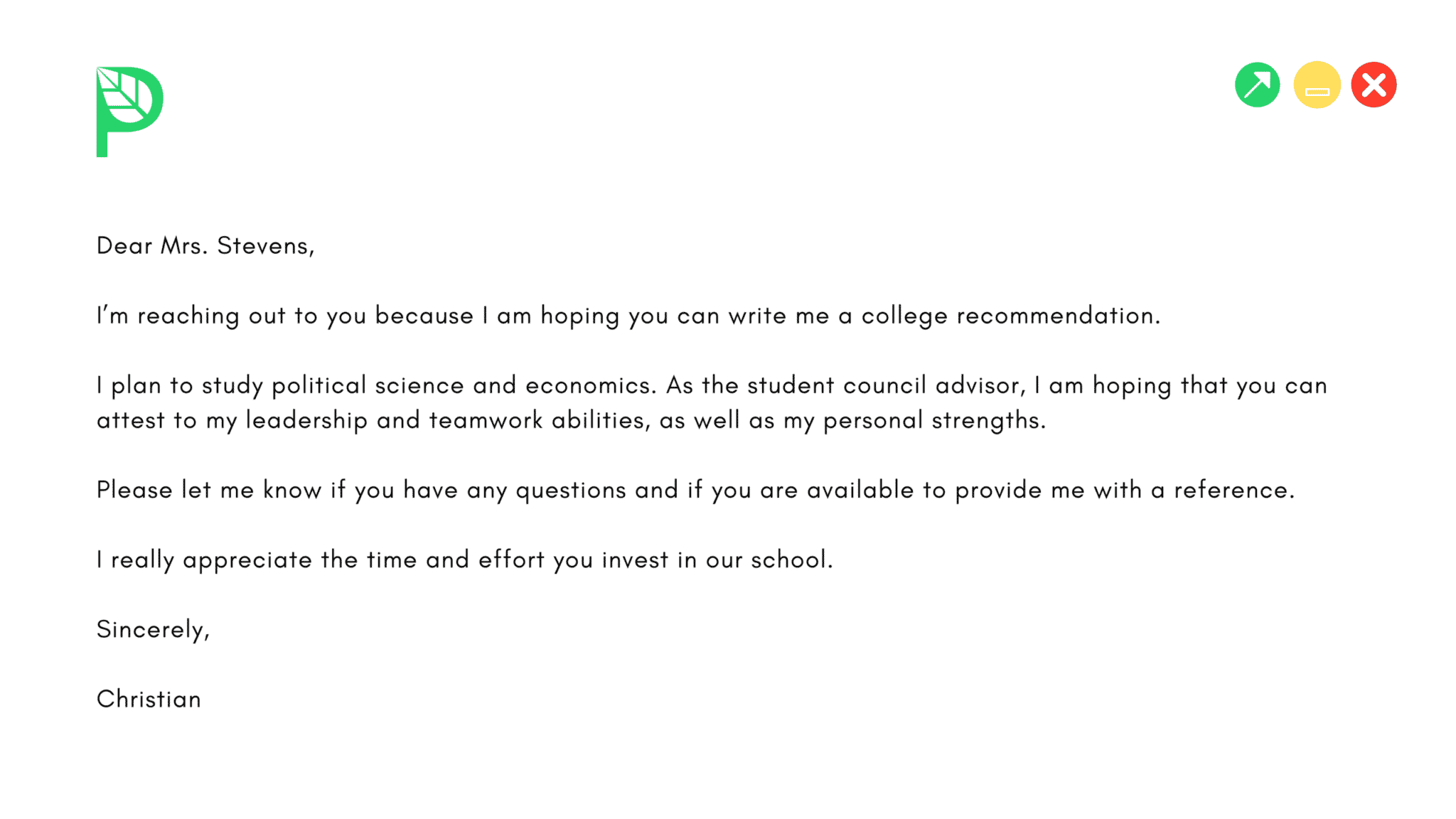Letters of recommendation are an important admissions factor. This is because they can help personalize the admissions process by providing key insights into how you are perceived by your teachers, coaches, and advisors.
College admissions committees want to admit high-achieving, thoughtful, professional students. Letters of recommendation can help demonstrate whether or not you fall into these categories. This is why it is important to know who to ask and how to ask for a letter of recommendation during your senior year of high school.
If you are currently in your junior year of high school, do your best to foster thoughtful, professional relationships with faculty members and teachers so that when it’s time, you will be able to include a detailed, genuine reference letter as part of the college application.
Complimentary Initial Consultation
Fill out this form to book your complimentary initial consultation.
What is a letter of recommendation?
A letter of recommendation is a personal, professional, or academic reference often sent along with a college or job application. The purpose of a letter of recommendation is to personalize your application. They also demonstrate that you have a supportive community of people who believe in you and are happy to advocate on your behalf.
During a job search, make sure to touch base with your letter writer to provide them with job descriptions, your cover letter, company names, potential employers, and any known details about the hiring manager. If you are wondering how to ask someone for a letter of recommendation or how to draft a letter of recommendation request email, read on!
How important is a recommendation letter for your college application?
An impressive high school GPA, high SAT and ACT test scores, and a robust schedule of extracurriculars and clubs are all key factors in your college applications. A strong letter of recommendation for college admission, however, adds further credibility to your application.
If you are applying to the Ivy-leagues or other highly-selective colleges, a glowing recommendation letter may be exactly what you need to stand out! Keep this in mind during the college application process as you formulate your letter of recommendation requests and research how to ask for a recommendation letter.
Who to ask for a letter of recommendation?
As you prepare your college applications or search for a new job, consider your letter of recommendation requests carefully. Of your teachers, coaches, mentors, previous employers, school counselors, and advisors, who can speak best to your overall character, work ethic, and academic abilities? Who do you trust most to advocate for you?
Many colleges ask for several letters of recommendation as part of the admissions process. Plan ahead and make sure you ask for references as early as possible. This will help ensure that you remain organized and on track this application season.
An important first step is asking for a letter of recommendation by email. In this article, we will review several effective email templates, as well as several successful examples of college letter of recommendation requests.
How to ask for a recommendation letter that will successfully boost your application: 5 actionable tips
If you are wondering how to ask a teacher for a letter of recommendation, read on! It can feel intimidating to know how to ask for a letter of recommendation for college. This is why it’s important to feel prepared and to know what to expect.
Before you move forward with your recommendation requests, review these 5 helpful tips on how to ask a teacher for a letter of recommendation for your college applications or how to ask a professor for a letter of recommendation for grad school.

Meet with our college admissions experts
Plan ahead
Colleges and universities often require two to three letters of recommendation as a part of the admissions process. Plan ahead and actively reflect on who is best suited to write you a detailed, genuine letter of recommendation. Teachers, coaches, mentors, academic advisors, and high school guidance counselors are all good choices!

Give your references as much notice as possible. College application season is a busy time for teachers, too. They likely have other letters of recommendation to write. Respect their time and schedule by asking for recommendations early. Sometimes teachers can feel overwhelmed and will only agree to write a certain number of college recommendations. This is another reason why it is important to plan ahead and ask for references early.
Ask your potential references in person before sending an email
Try your best to ask your potential references in person before sending them an email. This is especially important if you routinely interact with your potential reference or have the ability to see them easily. Sending letters of recommendation request emails is useful and practical; this is because teachers can easily refer back to them. Your initial request, however, should ideally be made in person. Not only does this feel more personal, but it will more likely be successful. An email can be overlooked or ignored, whereas an in-person request cannot.
Provide guidance & key details
Your references must have a clear understanding of what your expectations are moving forward. Provide them with key details — such as a list of the schools you are applying to, your prospective major, your list of extracurricular activities, a brag sheet, the letter of recommendation deadline, as well as where to send the letter once it has been completed.
If possible, schedule a time to sit down with them to discuss your goals, ambitions, as well as your reasons for applying to each college face-to-face. Check in to make sure they have all of the information they need to write a successful letter of recommendation. You may even consider sharing your college essay with them. Overall, when considering how to request a letter of recommendation, remember, the more details they have the better!
Make sure to follow up
It’s professional and polite to follow up with your references after you submit your college applications. Let them know which schools you got admitted to so that they can celebrate with you! Your teachers have worked hard on your behalf and are personally invested in your success. Acknowledge this by keeping them up-to-date about your applications.
Send thank you notes
When asking for a letter of recommendation, remember, your references are doing you a favor. Express your gratitude! Send them a thank-you note afterward. Not only will your references appreciate you taking the time to thank them, but it will likely improve their opinion of you. This will come in handy if you need to list them as a reference again in the future!

How to ask for a letter of recommendation via email: Sample emails
It can feel intimidating to reach out to someone via email for a personal reference. This is why it’s important to be prepared and to know what to expect. Asking for a letter of recommendation samples can help you feel prepared and write professional emails. Compare and contrast several sample requests for a letter of recommendation from professors before drafting your own email.
Below are several examples of a successful letter of recommendation request email. Use each letter of recommendation request sample as a guideline as you move forward with your applications.



Free customizable letter of recommendation request template
Review how to ask for a letter of recommendation via email samples carefully before continuing. Then use the template below to help you get started and draft a professional email. Feel free to customize and personalize the message!
Hello [name],
I’m reaching out because I’m applying for college and am in the process of organizing my written application materials. Are you willing and able to write me a letter of recommendation?
I really enjoyed taking your class on [blank]. Your assignments helped me with [blank] and [blank]. During college, I plan to study [blank]. Therefore, I was hoping you could speak to my ability to [blank] in your college recommendation letter.
Please let me know if you have any questions and if you are available to provide me with a reference.
Thank you,
[Your Name]
5 common mistakes to avoid when asking for a letter of recommendation
A detailed, genuine letter of recommendation can enhance your college applications greatly, especially if you are applying to Ivy League colleges, but a generic or negative letter of recommendation can be damaging. Here are 5 common mistakes to avoid when asking for a letter of recommendation.
Asking the wrong person
If you did not receive high grades in a class or were consistently tardy or absent, do not ask this teacher for a recommendation. Reflect thoroughly and honestly on your interactions with them. Were you a good student in their class? Did you consistently submit high-quality work? Will they have positive things to say about you?
If possible, also avoid asking teachers or professors who you have not seen or interacted with in several years. Ideally, you want detailed letters of recommendation. This may prove to be difficult if you have not seen your potential reference in several years.
Procrastination
It’s important to be respectful of your teachers’ time. If you do not give your references enough notice to plan ahead, they may decline your request for a recommendation or miss the deadline. Avoid these potential stressors by planning ahead and avoiding last-minute requests. Give your references plenty of time to write a good letter.
Disorganization
Make sure you are organized! Make a list of deadlines. Send your references gentle but persistent reminders as deadlines approach. Avoid procrastination and disorganization. Make sure you know how many letters of recommendation you need for each school you are applying to, when they are due, and how to submit them.
Being vague
Avoid being vague and give your references as many details as possible. If you know what you want to study, make sure to tell them! Similarly, if you are passionate about attending a certain school, tell them why.
You do not want a generic reference letter, especially if you are applying to competitive schools. Be as specific and as detailed as possible. Provide them with copies of your application materials and your updated resume and Linkedin (if applicable). Be clear about what your hopes and expectations are for their letter of recommendation.
Not following up
It’s important to follow up to let your teachers know how your applications are progressing and to say thank you. Also, if you do not follow up, you risk possibly being forgotten… Teachers are incredibly busy at this time of year, so follow up to make sure they are prepared to meet the earliest deadline. On the off chance that your reference can no longer write you a letter of recommendation, it’s important to have given yourself enough time to find an alternative reference.
Key takeaways from how to request a letter of recommendation
Letters of recommendation can be powerful application factors. College admissions officers want to admit students who are capable of academic success. By fostering close, professional relationships with past and current teachers, you increase your chances of receiving thoughtful, professional recommendations.
When requesting a letter of recommendation, make sure you plan ahead, provide your references with ample time, stay organized, clearly outline your expectations, provide all the necessary details and information, follow up with your references, and provide gentle reminders as application deadlines approach.
FAQs related to requests for letters of recommendation
Still have questions about letters of recommendation? Read on for some frequently asked questions and answers.
What do you do at a high school internship?
High school internships allow students the opportunity to apply their knowledge and skills in a professional setting while still in school. These internships offer carefully planned and monitored work experience with the goal being to gain additional knowledge from on-the-job exposure.
How to find an internship for high school students?
There are many avenues that you can take to find the perfect internship for you. Internships can be found just as easily as jobs. Our recommendation is to simply do your research on indeed or LinkedIn. Find something in your area that is perfect for you.
Are paid internships for high school students difficult to get?
This depends on the situation. Typically, an internship isn't about the money, but more so the experience that you gain from the company. With that being said, paid internships aren't impossible to find but they are not too common. It all depends on the research that you do.
Are online internships for high school students worth it?
The benefit of an online internship is not having to worry about commuting to the workplace and if it is paid you'd save on the expense of not having to drive.
What is the minimum age for an internship?
The minimum age of a working minor is 15, but they are not allowed to work more than 5 hours a day. If you are 18 and over applying for an internship, then you are allowed to work a more structured job.
Can you get an internship while studying at high school?
Juggling both a job and school can be a more difficult task to handle, but again, it is not impossible! You have to be able to manage your time appropriately and make sure not to get behind in school.





